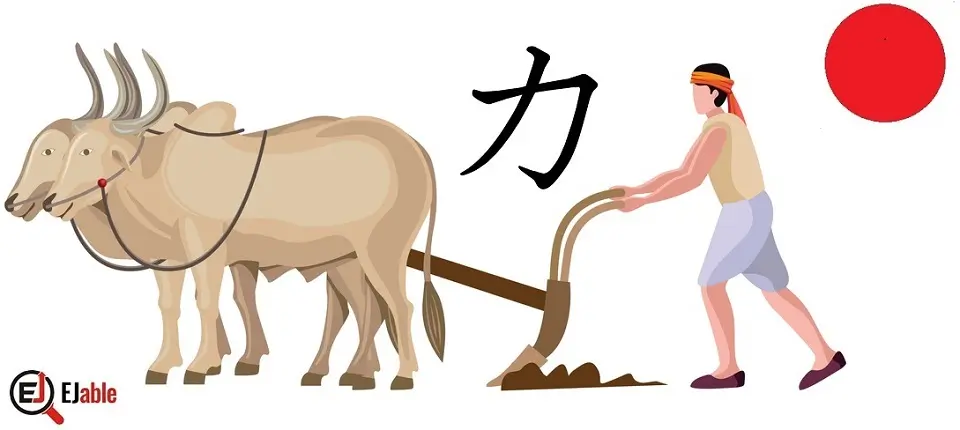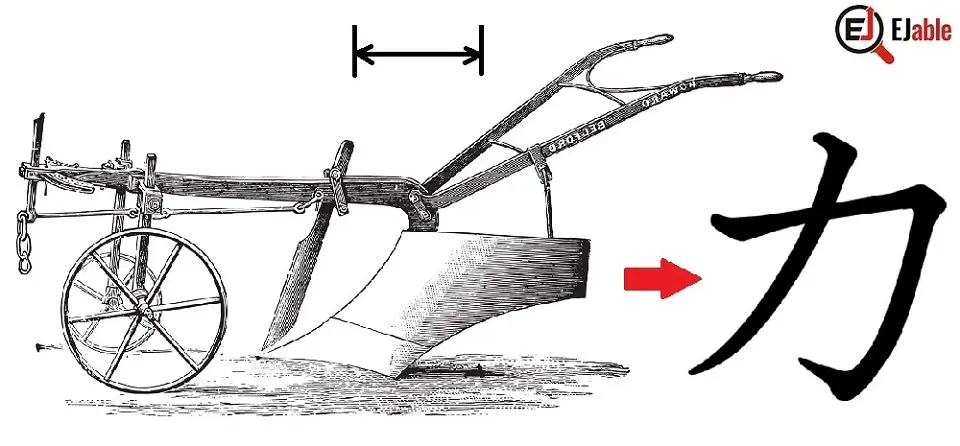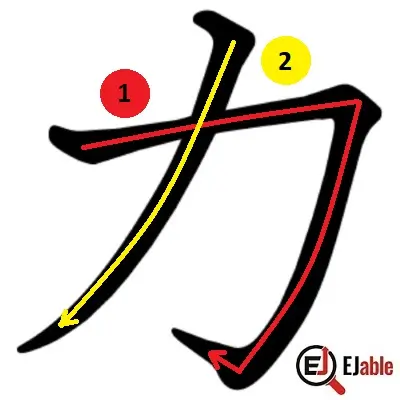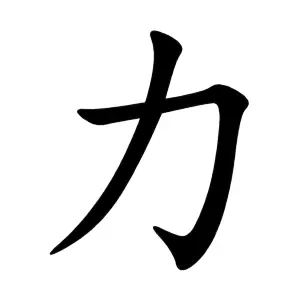Kanji for Power, Strength, or Force: 力 (Chikara)

The Japanese kanji for “Strength” or “power” is 力.
The pronunciation of the Kanji 力 is “chikara” (ちから) in its kun’yomi (Japanese reading) and “riki” (リキ) or “ryoku” (リョク) in its on’yomi (Chinese reading). The shape of this kanji is rather simple, and its shape has a clear origin.
Moreover, the other meanings of the Kanji of Chikara are all related to power: force, strength, might, vigor, energy, capability, ability, proficiency, etc.
The power Kanji 力 is constructed with 2 strokes. It is part of the JLPT N4 syllabus (please check the list of JLPT N4 kanji) and is taught in grade 1 in Japanese schools.
Origin of the Shape 力
In ancient Chinese inscriptions, the character for “power,” 力, was depicted as a plow. Hence, it is one of the tools requiring human strength to operate. Over time, the shape underwent simplifications to make the modern form of this Kanji.
Mnemonic: How to Remember the Kanji of Power or Strength (力)
To remember this kanji, you can think of the right stroke as a human arm and the left stroke as the effort exerted or the movement of the muscle. This can help you associate the shape of 力 with the concept of “strength” or “power.”
However, an easier and quicker way to learn this kanji is simply imagining the shape of an ancient plow used for agriculture in the olden times. The following picture visually explains it for you to remember the kanji of Chikara (power or strength) fast:

Stroke Order for the Kanji 力
The following illustrations show the order of the 2 strokes to write the Kanji 力:


力 as a Radical and Component in other Kanji Characters
The kanji 力 is also used as a Kanji radical, known as “bushu,” in other characters to imply power, strength, or energy. The presence of 力 in these characters gives a sense of force or effort to their meanings. 力 also appears as a component in other Japanese Kanji characters.
Overall, Kanji 力 appears as a radical or as a component in 202 Kanji characters, including 34 Jōyō Kanji.
Examples of 力 as a radical
Following are some examples of kanji where 力 (power/force or strength) appears as a radical:
- 動 (dou, “to move”): This character combines the radical for power, 力, with the kanji 重, meaning “heavy”. It suggests the idea of exerting effort or force to move something heavy.
- 勉 (ben, “to strive”): This character combines 力 with 免, which means “to avoid”. It represents the idea of exerting effort to avoid failure or to improve oneself.
- 労 (rou, “labor” or “work”): This character combines 力 with 老, meaning “old”. It represents the idea of work or labor that requires effort and can make one feel old.
- 勝 (shou, “victory”): This character combines 力 with 朕, which historically referred to a royal “we”. It represents the idea of overcoming something through power or strength.
- 劣 (retsu, “inferior”): This character combines 力 with 少, meaning “few” or “little”. It suggests the idea of having less power or being inferior.
- 募 (bo, “to recruit” or “to raise funds”): This character combines 力 with 母, meaning “mother”. It suggests gathering power or resources, just as a mother might gather resources for her family.
- 加 (ka, “to add”): This character combines 力 with 口, meaning “mouth.” It can suggest the idea of adding power or force.
- 剛 (gou, “strong”): This character combines 力 with 岡, meaning “hill.” It suggests the idea of a strong or powerful hill and, by extension, someone strong.
- 勇 (yuu, “brave”): This character combines 力 with 甬, which means “path”. It suggests that a person exerts their power or bravery to follow their path.
- 勤 (kin, “diligence”): This character combines 力 with 堇, which means “violet.” It suggests the idea of exerting power or effort diligently and consistently, like a violet growing and blooming in the face of adversity.
- 男 (Otoko, “man”): This Kanji combines the rice field Kanji 田 and strength or power 力 to suggest man as the power for farming.
As always, the meanings and interpretations of kanji can vary depending on the context, and this is just one way to understand the Kanji 力 (chikara), which represents power, strength, or force.
Power (Chikara) Kanji in Compounded Words
The kanji for “power” or “strength,” 力 (ちから, chikara), is commonly used in the Japanese language and forms part of many compound words. There are 100 Japanese words that begin with the Kanji 力, and it appears in 1073 words.
Examples of Kanji 力 in Compounded Kanji Characters
Following are the examples where the Kanji for power or strength appears in Japanese compounded Kanji characters:
- 力学 (りきがく, rikigaku): Physics.
- 努力 (どりょく, doryoku): Effort, endeavor.
- 力強い (ちからづよい, chikarazuyoi): Powerful, strong.
- 協力 (きょうりょく, kyōryoku): Cooperation, collaboration.
- 能力 (のうりょく, nōryoku): Ability, capacity.
- 力量 (りきりょう, rikiryō): Ability, capacity, competence.
- 力作 (りきさく, rikisaku): A work of great effort; masterpiece.
- 人力 (じんりょく, jinryoku): Manpower, human effort.
- 強力 (きょうりょく, kyōryoku): Powerful, strong.
- 腕力 (わんりょく, wanryoku): Arm strength.
- 労力 (ろうりょく, rōryoku): Labor, effort.
- 支援力 (しえんりょく, shienryoku): Supportive power or strength.
- 引力 (いんりょく, inryoku): Gravity.
- 気力 (きりょく, kiryoku): Willpower, energy.
- 重力 (じゅうりょく, jūryoku): Gravity.
- 戦力 (せんりょく, senryoku) war potential
- 武力 (ぶりょく, buryoku) military power
- 暴力 (ぼうりょく, bōryoku) violence, mayhem
- 精力的 (せいりょくてき, seiryoku-teki) energetic, vigorous
- 全力 (ぜんりょく, zenryoku) whole energy
- 体力 (たいりょく, tairyoku) stamina, endurance
- 勢力 (せいりょく, seiryoku) influence, power
- 電力 (でんりょく, denryoku) electric power
- 有力 (ゆうりょく, yūryoku) prominent, strong
- 魅力 (みりょく, miryoku) charm, attraction
- 権力 (けんりょく, kenryoku) power, authority
These compound words illustrate the diverse contexts in which the concept of “power” or “strength” is integrated, ranging from physical strength to abstract concepts like effort, ability, and natural forces.
Check other Kanji characters on the page “How to Learn Kanji“.

A long-term ex-pat in Japan, Himanshu comes with an IT background in SAP consulting, IT Business Development, and then running the country operations of an IT consulting multinational. Himanshu is the co-founder and Managing Director of ReachExt K.K. and EJable.com. He is also an Advisory Board Member of a Silicon Valley AI/IoT startup.
